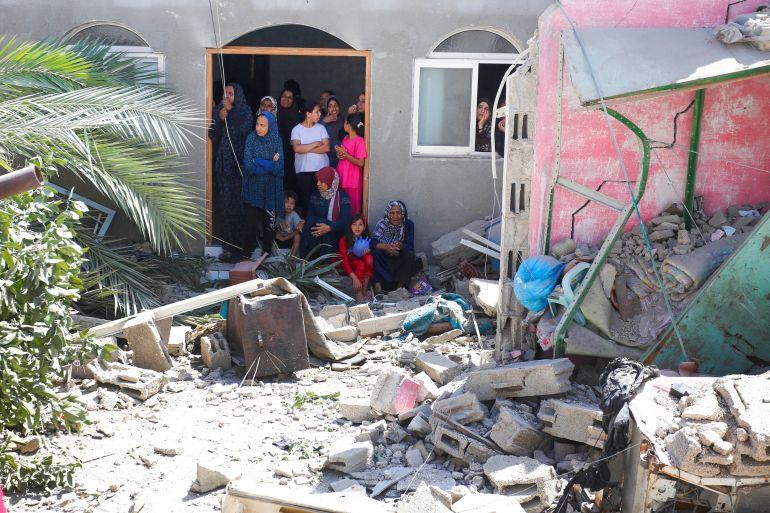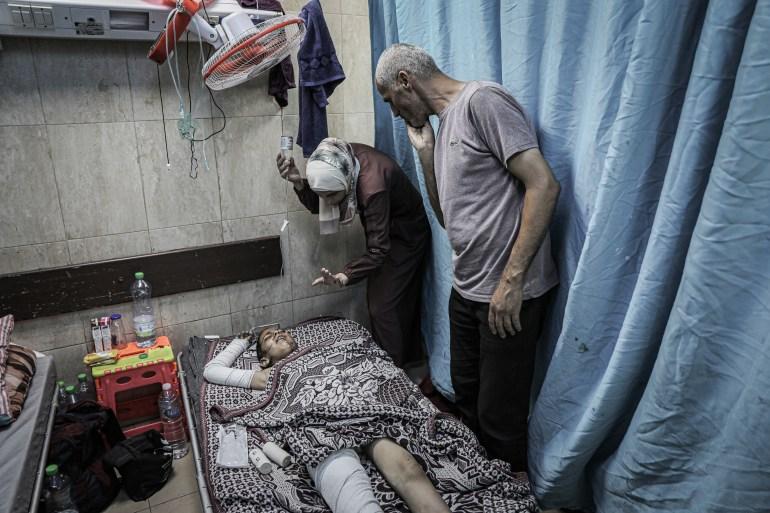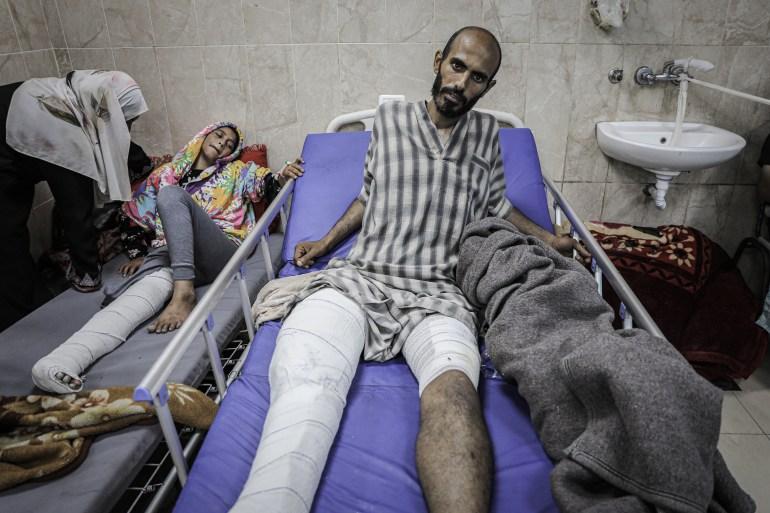Source: ALJAZEERA
ALJAZEERA MEDIA NETWORK

Survivors of the Nuseirat massacre recount the devastation and the global apathy towards Palestinian lives.
Deir el-Balah, Gaza – The fortnight since the June 8 Nuseirat tragedy, where Israeli forces killed at least 274 Palestinians to liberate four Israeli hostages, has failed to bring solace to the survivors.
Over 500 more Palestinians were wounded in the assault, overwhelming Deir el-Balah’s Al-Aqsa Martyrs Hospital, with the floors crowded with suffering, bleeding, and screaming individuals.
Numerous wounded remain in the hospital. Here are some of their stories.
 Raghad and her dad
Raghad and her dad
Raghad al-Assar, a 12-year-old girl, lay still with her head wrapped in bandages.
She was injured in the Israeli attack that hit her home during the massacre. Her father Mohammad, 46, stood nearby, hardly able to speak. Two of his daughters perished in the massacre, and his wife and another daughter, Rahaf, are in critical condition in intensive care.
Mohammad, who sells clothes at the Nuseirat camp market, described the chaos as drones and quadcopters targeted people in the market, causing explosions everywhere.
He took shelter in his shop, trying unsuccessfully to contact his family.
“I was watching the street and saw people falling, hearing them scream and plead … no one understood what was happening,” Mohammad recalled.
His eyes welled up with tears as he remembered a relative calling to inform him that their home had been hit and two of his daughters were killed.
“I didn't grasp what I was hearing. I ran out amidst the shelling, trying to take a shortcut, but it was too chaotic. People were running, falling under the heavy firing, right in front of me.”
About two hours later, Mohammad finally reached Al-Aqsa Martyrs Hospital – only to find scenes of carnage.
“There was blood everywhere, victims, injured, body parts, and cries of anguish… everywhere… there was no place to step. It looked like Judgment Day,” he described.
Mohammad frantically searched for his family, eventually finding his injured wife and daughter.
But Raghad was missing.
Mohammad and relatives scoured the hospital, looking at wounded people lying in corridors and checking the bodies prepared for burial.
“We finally found her past midnight. She was on the ground, unconscious. Surrounded by dead bodies and injured people. Initially, they thought she was dead.
“I lost two daughters so they could free four Israeli captives. Now, I fear losing my wife and surviving daughter due to poor medical care,” Mohammad mourned.
 Ahmed
Ahmed
Ahmed Abu Hujair, 32, was heading to the market for vegetables and essentials when chaos erupted.
“Suddenly, quadcopters and helicopters appeared. I saw armed men disguised as vendors in the market opening fire at people,” Ahmed recounted.
“The market was packed, especially at that hour. Many people were getting hurt, falling, screaming.”
Before Ahmed could grasp the situation, he was shot five times in his legs.
He lay there, bleeding, among hundreds of injured for more than an hour until ambulances could enter and transport them to the hospital. He lost consciousness multiple times due to blood loss.
It was akin to Black Hawk Down, Ahmed said, comparing it to the 2001 war movie. But the choppers weren’t there to rescue him.
“They were directly targeting us with large bullets,” Ahmed explained. “My right leg was almost shattered from top to bottom by three bullets, and my left leg was severely injured by two bullets.”
Two months ago, seven of Ahmed’s family members were killed by Israeli bombs on their home in Nuseirat – his mother, sisters, and brothers.
“My father and I miraculously survived, but he continues to suffer,” Ahmed said. “How much more must we endure? Was this massacre really carried out to retrieve four captives?”
Sixteen-year-old Ghazal al-Ghussein gazed out blankly. Shrapnel had struck her head during the indiscriminate bombing.
Her 15-year-old brother was killed, and her parents suffered head wounds and extensive burns. Her six-month-old sister sustained a severe eye injury with a corneal laceration.
Her aunt, 48-year-old Hayat al-Ghussein, sat beside her.
“I was planning to visit my sister, Ghazal’s mother, at their makeshift tent near the market,” she started. “I was at the market to buy a few things when shelling and gunfire erupted. I ran amidst the chaos, seeing children, women, and many injured people. I barely understood what was happening and ran, screaming.”
According to Hayat, the bombing and gunfire targeted the displaced persons’ tents, including her sister’s family's tent.
“People were fleeing their tents. When I reached my sister’s tent, I was shocked to see them all wounded and bleeding – my sister, her husband, their children, even their baby had been hit in the eye,” Hayat recalled.
She tried to reach them but had to run as the shooting was too close. When it finally calmed down, she returned to the tent as ambulances arrived to transport the injured and the dead.
“My nephew bled to death; no one could save him,” she sobbed.
“Ghazal can’t move, stand, speak, or hear. How does this happen to such a young girl? What did she do to deserve this?”
Due to the overwhelming number of injuries, the al-Ghusseins could not stay together at Al-Aqsa Martyrs Hospital. Some family members were moved to the similarly underequipped and crowded European Hospital in Khan Younis.
“How can this happen in the sight of the world?” Hayat questioned.
Your email address will not be published. Required fields are marked *